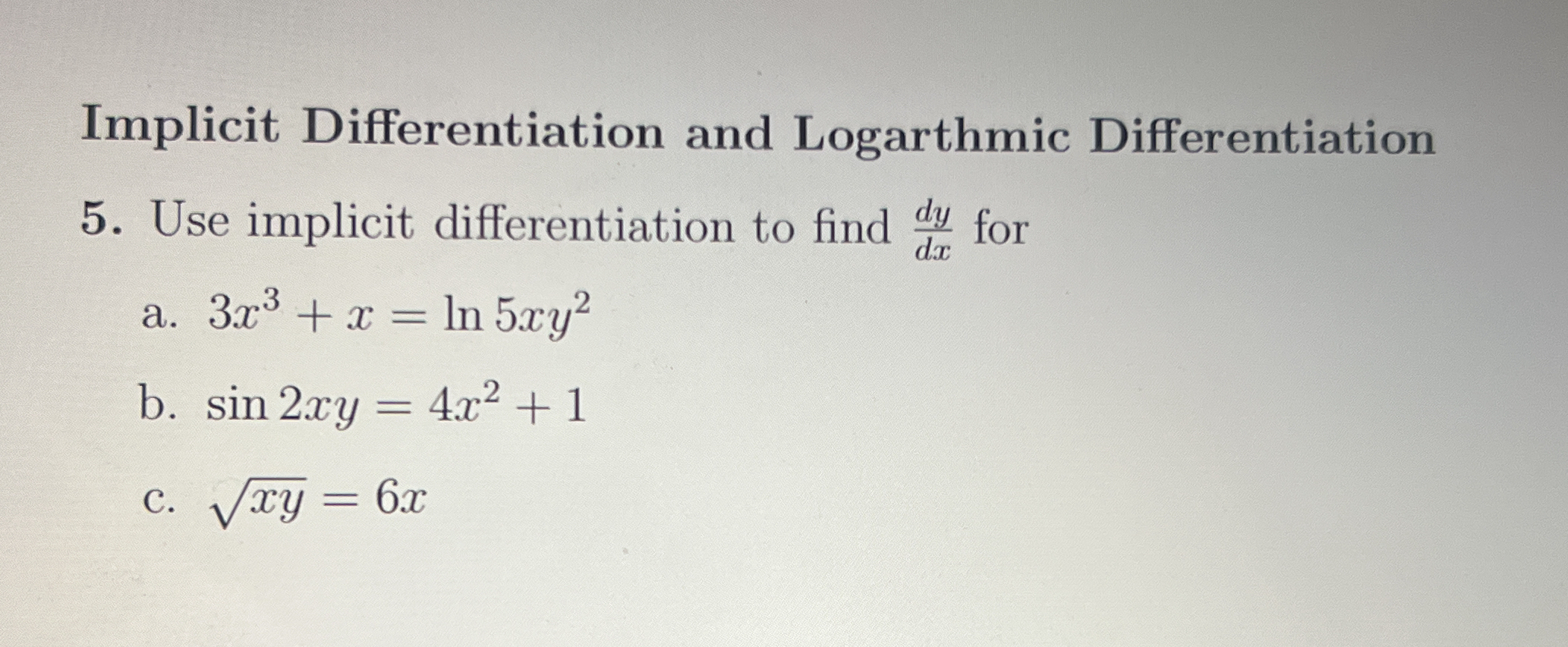Use implicit differentiation to find dy/dx for a. 3x³ + x = ln(5xy²) b. sin(2xy) = 4x² + 1 c. √(xy) = 6x

Understand the Problem
The question asks for the application of implicit differentiation to find the derivative dy/dx for three different equations involving both x and y. Each equation is to be differentiated using the implicit differentiation technique.
Answer
1. For part (a): $\frac{dy}{dx} = \frac{45x^3y^2 + 5xy^2 - 5y^2}{10xy}$ 2. For part (b): $\frac{dy}{dx} = \frac{8x - 2y\cos(2xy)}{2x\cos(2xy)}$ 3. For part (c): $\frac{dy}{dx} = \frac{12\sqrt{xy} - y}{x}$
Answer for screen readers
-
For part (a): $$ \frac{dy}{dx} = \frac{45x^3y^2 + 5xy^2 - 5y^2}{10xy} $$
-
For part (b): $$ \frac{dy}{dx} = \frac{8x - 2y\cos(2xy)}{2x\cos(2xy)} $$
-
For part (c): $$ \frac{dy}{dx} = \frac{12\sqrt{xy} - y}{x} $$
Steps to Solve
- Differentiate the first equation
Start with the equation $$ 3x^3 + x = \ln(5xy^2) $$ Differentiate both sides with respect to $x$:
- Left side: $$ \frac{d}{dx}(3x^3) + \frac{d}{dx}(x) = 9x^2 + 1 $$
- Right side (using the chain rule): $$ \frac{d}{dx}(\ln(5xy^2)) = \frac{1}{5xy^2} \cdot \frac{d}{dx}(5xy^2) $$ Using product and chain rules gives: $$ \frac{d}{dx}(5xy^2) = 5y^2 + 10xy \frac{dy}{dx} $$ So, $$ \frac{d}{dx}(\ln(5xy^2)) = \frac{5y^2 + 10xy \frac{dy}{dx}}{5xy^2} $$
- Set up the equation and solve for dy/dx
Equate the results from step 1 and clear fractions: $$ 9x^2 + 1 = \frac{5y^2 + 10xy \frac{dy}{dx}}{5xy^2} $$
Multiply through by $5xy^2$: $$ (9x^2 + 1)(5xy^2) = 5y^2 + 10xy \frac{dy}{dx} $$
Rearranging gives: $$ 10xy \frac{dy}{dx} = 45x^3y^2 + 5xy^2 - 5y^2 $$
Now, solve for $\frac{dy}{dx}$: $$ \frac{dy}{dx} = \frac{45x^3y^2 + 5xy^2 - 5y^2}{10xy} $$
This is the solution for part (a).
- Differentiate the second equation
For the second equation: $$ \sin(2xy) = 4x^2 + 1 $$ Differentiate both sides:
- Left side: $$ \cos(2xy) \cdot \frac{d}{dx}(2xy) = \cos(2xy)(2y + 2x\frac{dy}{dx}) $$
- Right side: $$ \frac{d}{dx}(4x^2 + 1) = 8x $$
- Set up the second equation and solve for dy/dx
Equating results: $$ \cos(2xy)(2y + 2x\frac{dy}{dx}) = 8x $$
Expand and isolate $\frac{dy}{dx}$: $$ \cos(2xy)(2x)\frac{dy}{dx} = 8x - 2y\cos(2xy) $$
So, $$ \frac{dy}{dx} = \frac{8x - 2y\cos(2xy)}{2x\cos(2xy)} $$
- Differentiate the third equation
Finally, for the equation: $$ \sqrt{xy} = 6x $$ Rewriting gives: $$ (xy)^{1/2} = 6x $$ Differentiate both sides: $$ \frac{1}{2}(xy)^{-1/2}(y + x\frac{dy}{dx}) = 6 $$
- Set up the equation and solve for dy/dx
Multiply through by $2\sqrt{xy}$: $$ y + x\frac{dy}{dx} = 12\sqrt{xy} $$
Isolate $\frac{dy}{dx}$: $$ x\frac{dy}{dx} = 12\sqrt{xy} - y $$ Thus, $$ \frac{dy}{dx} = \frac{12\sqrt{xy} - y}{x} $$
-
For part (a): $$ \frac{dy}{dx} = \frac{45x^3y^2 + 5xy^2 - 5y^2}{10xy} $$
-
For part (b): $$ \frac{dy}{dx} = \frac{8x - 2y\cos(2xy)}{2x\cos(2xy)} $$
-
For part (c): $$ \frac{dy}{dx} = \frac{12\sqrt{xy} - y}{x} $$
More Information
Implicit differentiation allows us to differentiate equations involving both variables without explicitly solving for $y$. It's a powerful tool for handling complex relationships between variables.
Tips
- Forgetting to apply the product rule when differentiating terms like $xy$.
- Not using the chain rule for derivatives involving logarithms or trigonometric functions.
- Failing to isolate $\frac{dy}{dx}$ properly from the equation.
AI-generated content may contain errors. Please verify critical information